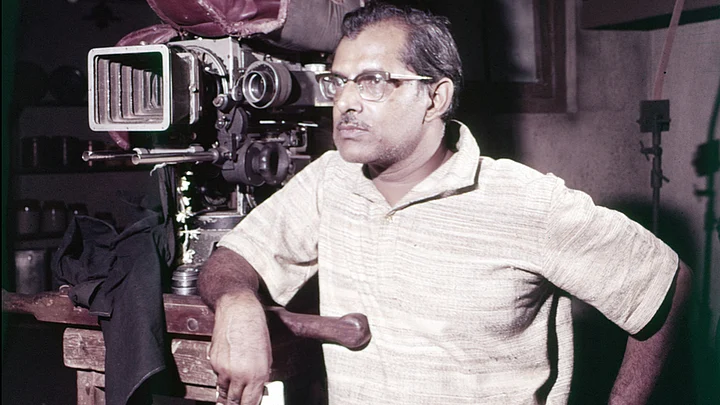My introduction to Hrishikesh Mukherjee was as a child watching Golmaal for the first time. I had never until then seen a Hindi film that was funny without being slapstick. The music, conversation, plot had me enthralled. I was a little kid, eyes boring into the television, laughing loudly at an angry man being duped and getting even angrier. The scene where Amol Palekar’s moustache comes off in a glass of water and Utpal Dutt realises he’s been played had me rolling with peals of laughter. It had something of the Jerry outsmarting Tom character to it.
Post Golmaal, I saw Chupke Chupke, again I was taken by its simplicity and humour and the elaborate prank they play on an unsuspecting old man.
Children like mischief and that’s what I could relate to when watching these films. Here was a story geared towards harmless mischief, simply acted and felt, everyone in on the elaborate joke except the victim. The audience was complicit in this fun of fooling someone. And that someone was in these two films a pompous old man, rather full of himself and his ideas.
Hrishikesh Mukherjee is a director of some of the best loved Hindi films of yore. He is credited with introducing “middle of the road cinema” in India. Films that weren’t kitschy slapstick comedies, or elite and high brow dealing with existential themes and topics. Some say he catered to the educated middle classes, although I feel his films cut through that divide. He has a style which was simple yet intricate, the conversations, characters and dialogue all appeared honest and effortless.
Life and Influences
Guided under the tutelage of Bimal Roy who was a mentor to Basu Bhattacharya and Gulzar too, Mukherjee’s ambition by his own admission was to be a biochemist. He had done a B.Sc in Chemistry Honours when, besotted by photography he worked in an editing lab. Post this he planned to get back to his studies and do an M.Sc when Bimal Roy got him to Mumbai and got him into film editing.
His skill as an editor is legendary. He could salvage films like no one else. And this unique editing style he brought to the films he directed as well, setting new conventions in Hindi cinema.
Mukherjee says Bimal Roy told him to learn all aspects of filmmaking if he wanted to be a filmmaker. Reluctant to discuss his past at first Mukherjee spills the beans on how he came to be a filmmaker. You can hear him talk about it here.
He eventually wrote the script for Do Bigha Zameen, which was inspired by the neo-realist style of Italian cinema at the time and specifically by the film Bicycle Thieves.
The other influence in his life was Dilip Kumar. Mukherjee credits him for making him a director, working for free in his first film Musafir - a film that looked at the cycle of life, as families go in and out of a house, and we see birth, marriage and eventual death.
Filmlore
The film that is considered his magnum opus is Anand starring Rajesh Khanna and Amitabh Bachchan. Anand’s character was inspired by Raj Kapoor who was sick then. Mukherjee says Kapoor used to call him ‘Babumoshai’ as Anand’s character calls the doctor in the film. Amitabh Bachchan’s Bhaskar Banerjee is based on Mukherjee himself, keeping the Bengali identity as a clue, and Rajesh Khanna was Anand Saigal, a Punjabi, like Raj Kapoor.
The two were really close friends in real life and the story came from Mukherjee’s fear of losing Raj Kapoor.
Mukherjee’s lesser known film Satyakam, he called his finest and his fans vouch for its brilliance. Based on a novel written by a friend the film focuses on the disillusionment a young man faces in post independence India where the white rulers have simply been replaced by brown ones.
He made several other films that dealt with nuanced thoughtful themes. The popularly known ones are Anupama (1966), Khubsoorat (1980), Naram Garam (1981), Namak Haram (1973), Bawarchi (1972), Guddi (1971), Anuradha (1960), Mili (1975) and many more.
Towards the latter part of his life he made Jhooth Bole Kauwa Kaate which didn’t do well on either the critical or popular front. He though had established his credentials as a filmmaker long ago.
Looking Up at the Stars
Mukherjee is credited as having said, “Your art is your attitude to life.” His then was an extremely humble and affable attitude to have made the films he did. In an interview Mukherjee said, “Standing in your balcony one can look down and see the dirty drains or can look up and see the beautiful sky and stars.”
He died in 2006 of renal failure. His funeral saw only a sprinkling of people because he had been out of the limelight for many years. A funeral Raja Sen writes perhaps he would have appreciated.
